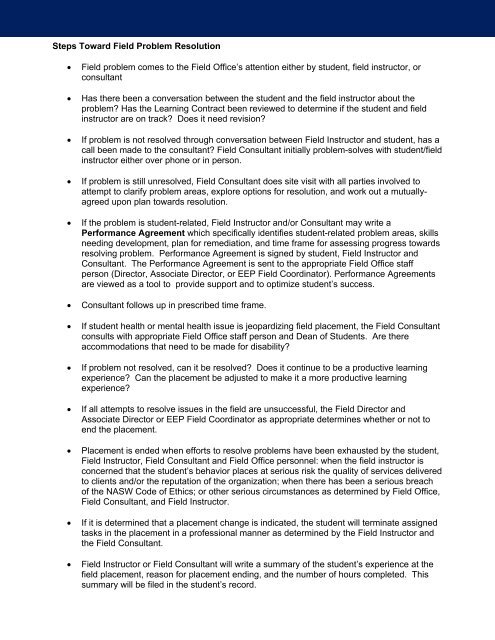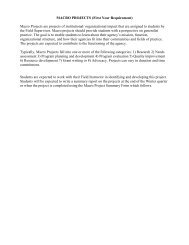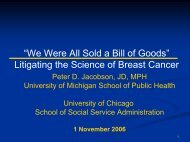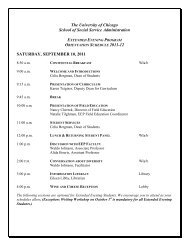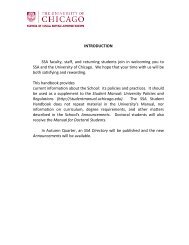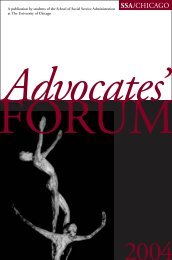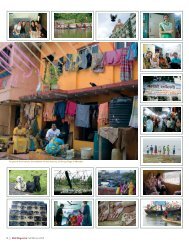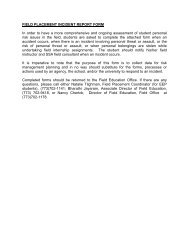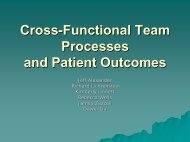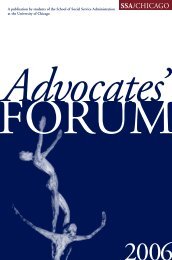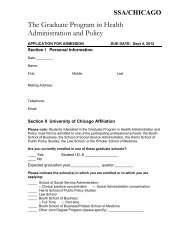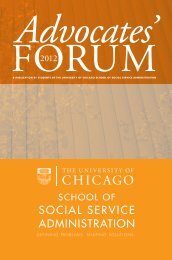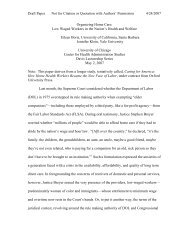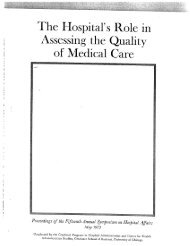The University of Chicago School of Social Service Administration
The University of Chicago School of Social Service Administration
The University of Chicago School of Social Service Administration
- No tags were found...
You also want an ePaper? Increase the reach of your titles
YUMPU automatically turns print PDFs into web optimized ePapers that Google loves.
Steps Toward Field Problem Resolution• Field problem comes to the Field Office’s attention either by student, field instructor, orconsultant• Has there been a conversation between the student and the field instructor about theproblem? Has the Learning Contract been reviewed to determine if the student and fieldinstructor are on track? Does it need revision?• If problem is not resolved through conversation between Field Instructor and student, has acall been made to the consultant? Field Consultant initially problem-solves with student/fieldinstructor either over phone or in person.• If problem is still unresolved, Field Consultant does site visit with all parties involved toattempt to clarify problem areas, explore options for resolution, and work out a mutuallyagreedupon plan towards resolution.• If the problem is student-related, Field Instructor and/or Consultant may write aPerformance Agreement which specifically identifies student-related problem areas, skillsneeding development, plan for remediation, and time frame for assessing progress towardsresolving problem. Performance Agreement is signed by student, Field Instructor andConsultant. <strong>The</strong> Performance Agreement is sent to the appropriate Field Office staffperson (Director, Associate Director, or EEP Field Coordinator). Performance Agreementsare viewed as a tool to provide support and to optimize student’s success.• Consultant follows up in prescribed time frame.• If student health or mental health issue is jeopardizing field placement, the Field Consultantconsults with appropriate Field Office staff person and Dean <strong>of</strong> Students. Are thereaccommodations that need to be made for disability?• If problem not resolved, can it be resolved? Does it continue to be a productive learningexperience? Can the placement be adjusted to make it a more productive learningexperience?• If all attempts to resolve issues in the field are unsuccessful, the Field Director andAssociate Director or EEP Field Coordinator as appropriate determines whether or not toend the placement.• Placement is ended when efforts to resolve problems have been exhausted by the student,Field Instructor, Field Consultant and Field Office personnel: when the field instructor isconcerned that the student’s behavior places at serious risk the quality <strong>of</strong> services deliveredto clients and/or the reputation <strong>of</strong> the organization; when there has been a serious breach<strong>of</strong> the NASW Code <strong>of</strong> Ethics; or other serious circumstances as determined by Field Office,Field Consultant, and Field Instructor.• If it is determined that a placement change is indicated, the student will terminate assignedtasks in the placement in a pr<strong>of</strong>essional manner as determined by the Field Instructor andthe Field Consultant.• Field Instructor or Field Consultant will write a summary <strong>of</strong> the student’s experience at thefield placement, reason for placement ending, and the number <strong>of</strong> hours completed. Thissummary will be filed in the student’s record.


